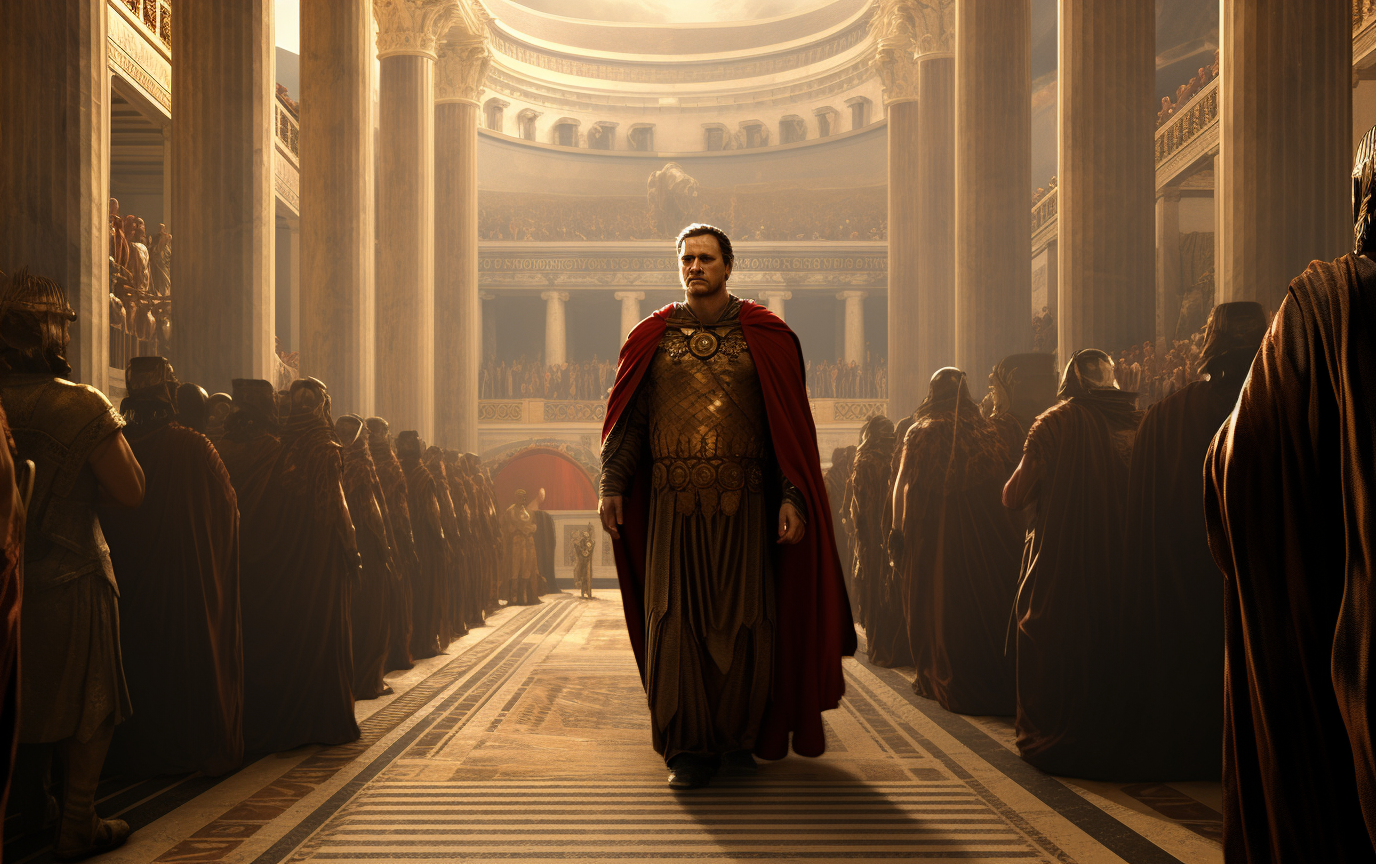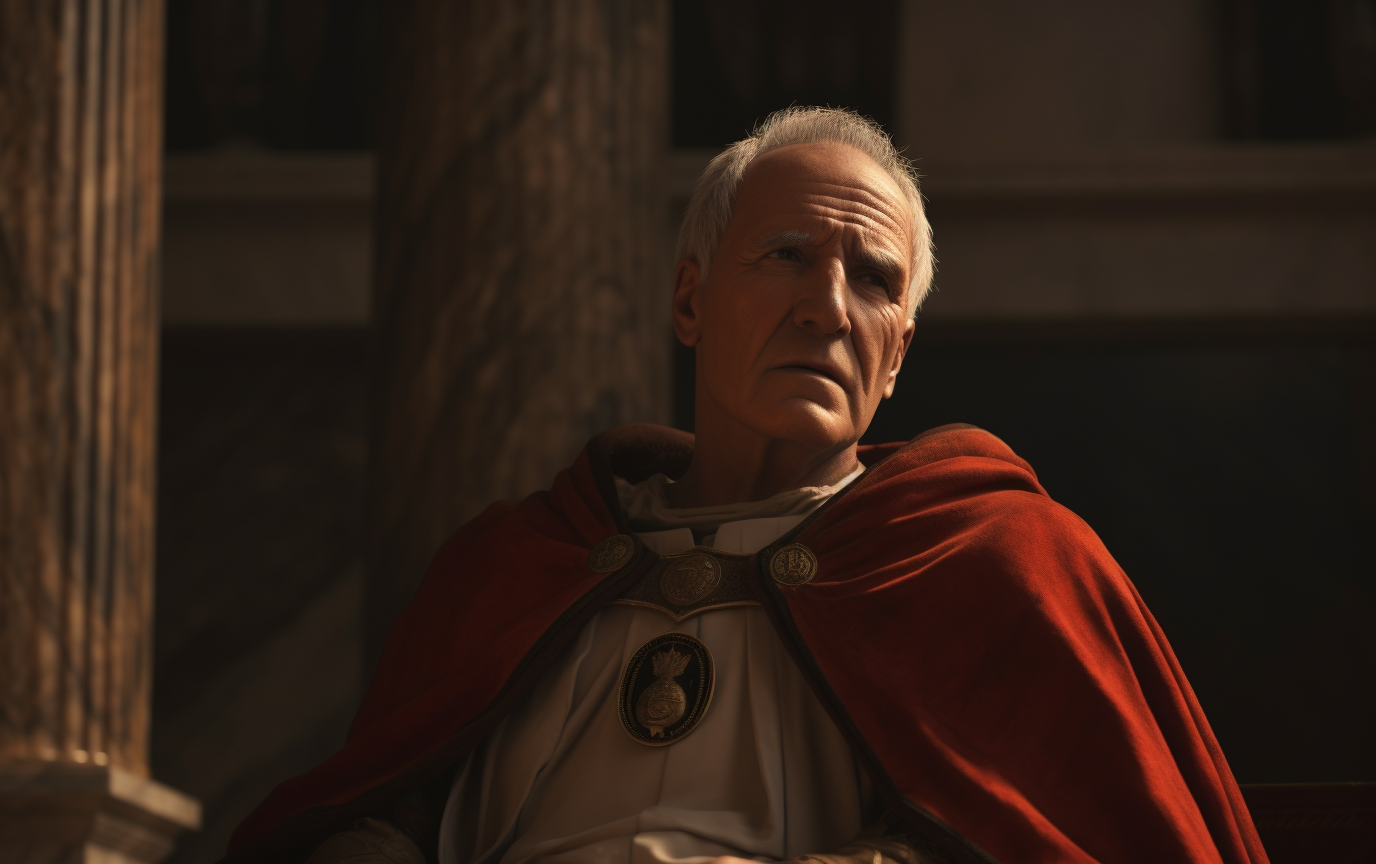
We’ve got a tale that has it all—ambition, treachery, high-stakes political drama, and the ultimate clash of ideologies. It’s the story of Lucius Sergius Catilina, known to us as Catiline. This is no mere historical footnote; this is an age-old battle of principles that questions the very fabric of society.
Setting The Stage: The Late Roman Republic
“First, a bit of context. Rome, during the late Republic, was not the gleaming bastion of civilization often portrayed in pop culture. The economic divide was palpable; a handful of wealthy families controlled significant portions of the state’s resources, while the masses struggled with debt and unemployment. Civil unrest was frequent, slave revolts were not uncommon, and the word ‘equality’ was more of an ideal than a reality. In these turbulent waters swam Catiline, a patrician who had fallen on hard times. In the midst of a society suffering from the very contemporary-sounding malaise of economic instability, social disparity, and political corruption. As previously noted, Debt was the ball and chain of the commoner, while the Senate was rife with bribery and self-serving alliances. A situation not too distant from the politics of modernity. This unstable backdrop was fertile ground for ambitious men with less-than-virtuous intentions.”
The Man, The Myth, The Legend
“So, who was this Catiline? A fallen aristocrat? A military man? A populist? The answer is—all of the above. Imagine a charismatic speaker who can tap into the public’s fears and hopes while possessing the military know-how to back his words with action. Sounds like a protagonist, right? Wrong. The only thing Catiline wanted to liberate was power—from others to himself. Catiline was a man of complexities—fiercely intelligent yet brazenly unscrupulous. Accusations clung to him like flies to honey; charges ranged from corruption to adultery, and even murder. Despite this, he had supporters, a testament to his allure. For Catiline, morality was a currency, to be spent when needed and hoarded when beneficial. The lust for power drove him; it consumed him.”
Political Machinations and Skullduggery
“What’s truly captivating about Catiline’s story is the sheer audacity of his plans. His conspiracy wasn’t just a coup d’état; it was an utter subversion of Roman society. He was scheming to assassinate key figures, yes, but his ambition didn’t stop at mere power grabs. He wanted to wipe debts, redistribute wealth, and essentially ignite a revolution from within, leveraging Rome’s own socio-economic disparity as his chief weapon. Catiline’s burning ambition culminated in a scheme so audacious, it shook Rome to its core—the Catilinarian Conspiracy. In which he plotted not only to murder key senators starting with Cicero, the Consul but to upend Roman society entirely putting an end to vested interests in the process. Imagine plotting to topple the government of the world’s first superpower!
Cicero: The Sentinel of Rome

Enter Cicero. The famed orator and statesman was the embodiment of Roman virtues, and he stood as the last sentinel between Catiline and chaos. Cicero’s speeches against Catiline are masterpieces of political discourse. He spoke loudly and clearly when he said, ‘How long, Catiline, will you abuse our patience?’ It was a direct challenge, almost a dare, to come clean. Cicero’s speeches laid bare the moral bankruptcy of Catiline’s plot, framing it as a betrayal not just of the Senate, but of Rome itself. Cicero was Catiline’s ideological opposite. Where Catiline was audacious, Cicero was cautious; where Catiline sought chaos, Cicero sought order and didn’t pull any punches when he declared in the Senate, ‘O what times! O what customs! The Senate understands these things. The consul sees them; and yet this man lives. Lives! He even comes into the Senate; he takes part in public deliberations; he notes down and marks out for slaughter every individual among us.’ His speeches were an alarm, a call-to-arms for all Roman patriots.
The Senate and the People: Rome’s Dichotomy
Here’s where things get really interesting. Despite Cicero’s eloquence, Catiline had supporters even within the Senate. This divide symbolized a greater schism in Rome between the ruling class and the common people, who were increasingly disillusioned with the status quo having many parallels with the political climate of modernity. It’s worth noting that Catiline’s plot gained traction because Rome was already teetering on the edge. Many Romans, especially those burdened by debt and disillusioned by rampant inequality, were drawn to Catiline’s promise of debt cancellation and wealth redistribution. These were the cracks in Rome’s marble facade, and Catiline was all too willing to wedge his ambitions into them. Catiline tapped into this divide, styling himself as a man of the people. However, he was anything but. His promises were not of reform, but of anarchy—anarchy he believed would elevate him to unparalleled heights of power.
The Stoic Perspective
This saga offers a fascinating lens through which to explore Stoicism. A Stoic, guided by wisdom, courage, justice, and temperance, aims for a life in accordance with nature. Catiline’s life, a vortex of vice and avarice, serves as a cautionary tale about what happens when we stray from these principles. It reminds us that individual desires, untamed by virtue, can sow seeds of chaos that affect not just the individual, but the society they inhabit. As we examine this tumultuous chapter through the lens of Stoicism, it becomes clear that Catiline was the antithesis of Stoic principles. Stoicism emphasizes self-control, rationality, and virtuous living. Catiline, blinded by his vices, was walking on a precarious ledge, miles away from Stoic ideals. Marcus Aurelius, a Roman emperor and Stoic philosopher, would likely condemn Catiline’s actions as entirely contrary to living in accordance with nature and rationality. Marcus more than any other leader in the history of the ancient world understood that times are always changing, and that no empire is permanent. In meditations he wrote:
“Alexander the Great and his mule driver both died and the same thing happened to both. They were absorbed alike into the life force of the world, or dissolved alike into atoms.”
This quote from Marcus Aurelius captures the Stoic philosophy’s view on the ephemeral nature of power and life itself. Marcus Aurelius often meditated on the impermanence of all things, including power and status, to keep himself grounded while being an emperor of Rome. The example of Alexander the Great serves as a potent reminder that regardless of one’s achievements or power, the end is the same for everyone. In this way, Marcus Aurelius places the relentless pursuits of power and glory into a cosmic perspective, trivializing them against the grand scale of existence and time.
The Final Act: A Lesson in Hubris
Despite gathering an army and making a last stand, Catiline’s ambitions crashed around him. He died in 62 BC, not in a blaze of glory, but with a whimper. His forces were ultimately defeated, and the man himself died on the battlefield, not as a martyr but as a cautionary tale. Cicero’s decisive actions, underscored by his stirring words, prevented a catastrophe, preserving the Roman Republic for another day. His demise served as a lesson for Rome, reinforcing the dangers of letting socio-economic disparities go unaddressed, and illustrating the catastrophic results of unbridled ambition. The downside of this is that the deep-rooted issues of social inequality, political corruption, and a lack of faith in traditional republican institutions didn’t vanish with Catiline’s defeat; instead, they festered so that by the time Julius Caesar crosses the Rubicon in 49 BC, the Roman Republic had experienced several decades of social upheaval, economic crisis, and political infighting. These conditions were ripe for someone—be it Catiline, Caesar, or another ambitious figure—to exploit for personal gain.
Conclusion: Why Catiline Matters Today
Why does Catiline matter? Because he embodies the timeless dangers lurking in every society—unbridled ambition, exploitation of social fractures, and the intoxicating allure of demagoguery. Over 2,000 years later, the lessons remain. To overlook the mistakes of the past is to risk facing them again in new, perhaps even more destructive, forms. So, there we have it, folks. Catiline—a man who showed that in the pursuit of power, one could either be a steward or a menace to society. His life, fraught with complexities and paradoxes, serves as an eternal example of the destructive potential of un-tempered ambition. It’s a lesson that, over two millennia later, we would do well to remember. Cataline was a man who shook Rome and, in doing so, created a timeless lesson on the fragility of societal structures and the eternal importance of virtue. The long and the short of this, is that if you are a true stoic who finds himself alive and well in a walled city, your job in politics is not to demolish the walls that protect you and offer you everything that you need to live a good life, but to find a better way of repairing them and making them ever more beautiful so that all may gaze upon them and bask in their protective glory and in doing so live their best lives too.

